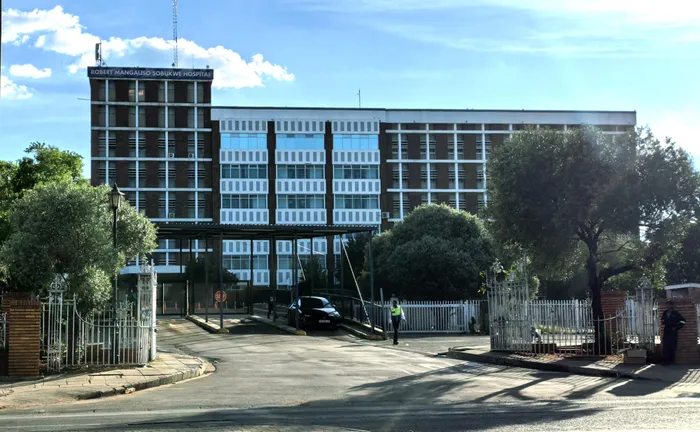Tighter oversight urged after AG flags NC Health failures

Robert Mangaliso Sobukwe Hospital in Kimberley, one of the facilities affected by the governance issues raised in the AG’s report.
Image: Danie van der Lith / DFA
THE DEMOCRATIC Alliance (DA) in the Northern Cape has renewed calls for stronger oversight of the provincial Department of Health, following a scathing report from the Auditor-General (AG) that highlighted persistent financial mismanagement and instability within the department.
The Northern Cape Provincial Legislature is expected to begin oversight visits to health facilities across the province next week, a step the DA has described as “long overdue” in strengthening accountability mechanisms.
According to the AG’s findings, the department ended the 2024/25 financial year with an overdraft and cash shortfalls amounting to 16% and 29% of the following year’s budget, respectively. The DA also claims that the department takes an average of five months to pay a single invoice, resulting in rising interest costs and pressure on already constrained resources.
The DA provincial spokesperson on Health, Isak Fritz, this week criticised what he described as longstanding failures of financial governance.
“It doesn’t seem as if a single cent allocated to this department has been spent in full accordance with the law for some time, and yet leadership failed to take any corrective action,” he said.
Fritz further pointed to leadership instability within the portfolio, noting that seven MECs have been appointed to the position over the past 12 years.
The DA also raised concern that while the department has established a Loss Control Committee, it has allegedly not investigated the R15.5 billion in irregular expenditure accumulated over a 10-year period, nor the R140 million in fruitless and wasteful expenditure recorded for 2024/25.
This, the DA argues, underscores the department’s inability to self-correct after receiving its 13th consecutive qualified audit, which the party believes reflects ongoing governance weaknesses that ultimately affect service delivery.
It added that this also reinforces the need for stronger oversight mechanisms, arguing that structures such as the provincial legislature should “tighten monitoring and evaluation of departmental affairs”.
The party also referenced Premier Zamani Saul’s remarks in September, when he described the state of the Northern Cape Mental Health Hospital – which he had previously labelled “a monument of corruption” – as “an embarrassment” to the province.
“Clearly, we cannot afford any delays in improving and implementing proper oversight,” Fritz said.
Department disputes irregular expenditure figure
The DFA sent a formal enquiry to the Northern Cape Department of Health with five questions related to the DA’s statement. The department did not respond by the time of publication.
However, in a statement posted to its official Facebook page earlier this week in response to an opinion piece published by the DFA, the department strongly rejected the R15.5 billion figure, calling it “mathematically impossible and journalistically reckless”. The department argued that its total annual budget is R6.8 billion and said the “alleged R15.5 billion” in irregular expenditure would represent “228% of the entire budget, which the department does not have”.
The department did not address the fact that the figure refers to cumulative irregular expenditure over multiple financial years, a standard Auditor-General category that records historic balances until they are properly dealt with.
The department’s statement further asserted that the latest AG report reflects “measurable improvements” in financial management over the past three years, including reductions in new irregular expenditure and fewer audit findings.
It added that its priorities remained “securing appropriate Treasury support, continuing systematic quality improvements, and delivering on our mandate to provide accessible, quality healthcare to 1.36 million Northern Cape residents”.
The department’s reference to improvements does not address core issues raised by the AG and opposition parties, which relate to the large backlog of historic irregular expenditure that remains on the department’s books. The AG’s latest report still resulted in a qualified audit – the 13th in a row – a status that indicates material misstatements, non-compliance with legislation, and weaknesses in internal controls. These issues persist despite the department’s claims of improvement.
A qualified audit, by definition, indicates that key financial information cannot be fully relied upon. Oversight bodies argue that until the R15.5 billion in accumulated irregular expenditure is investigated, condoned or recovered, and until consequence management is shown to be effective, year-on-year improvements alone do not resolve the systemic governance failures flagged by the AG.